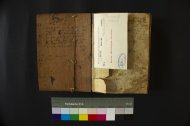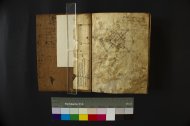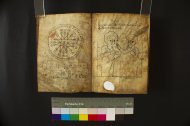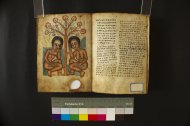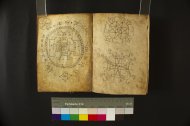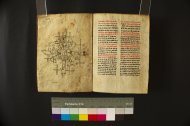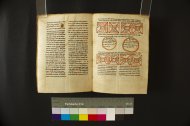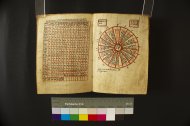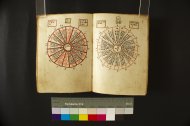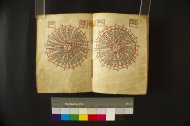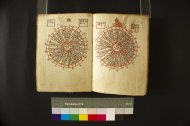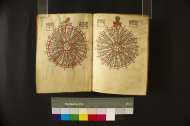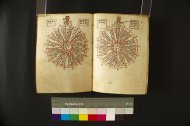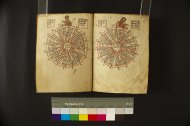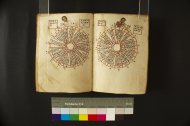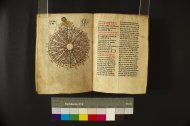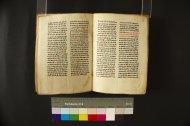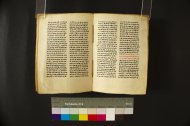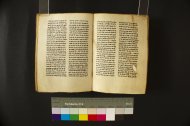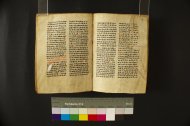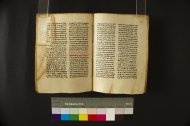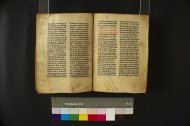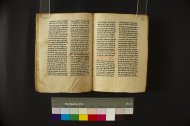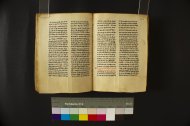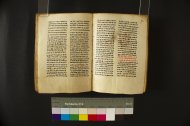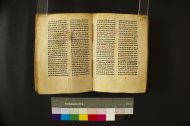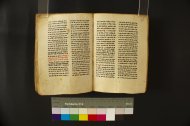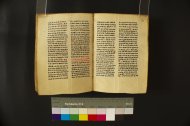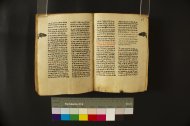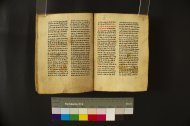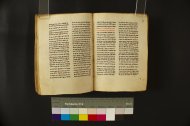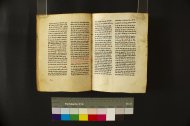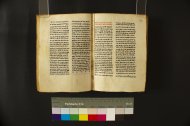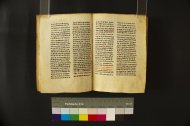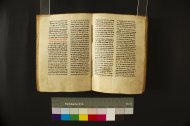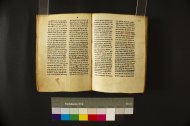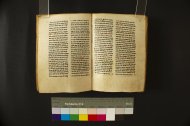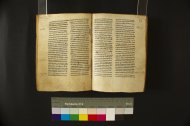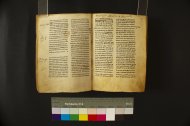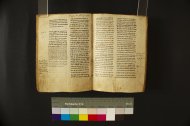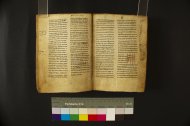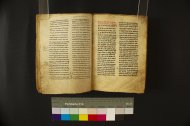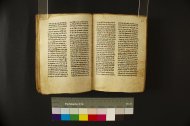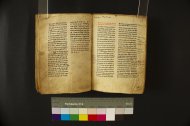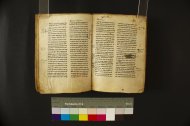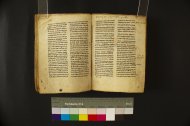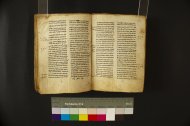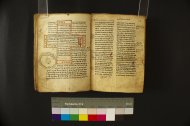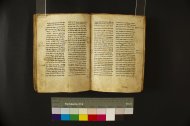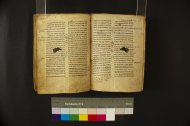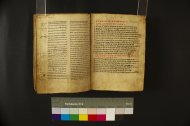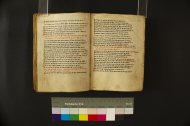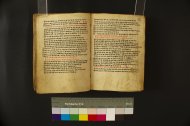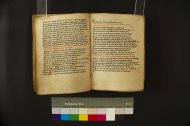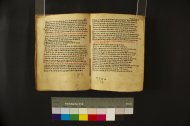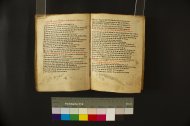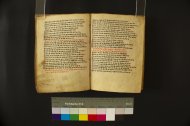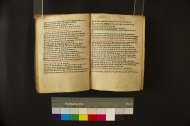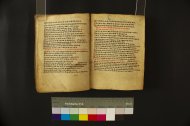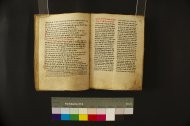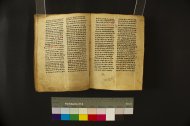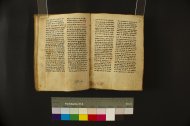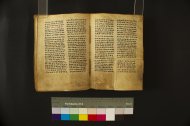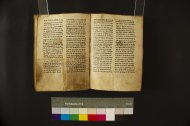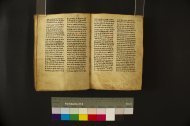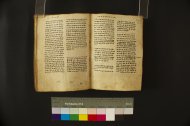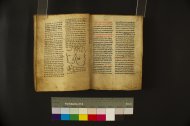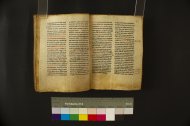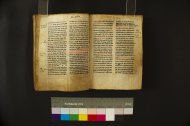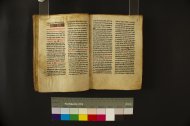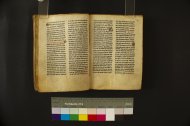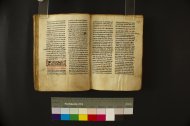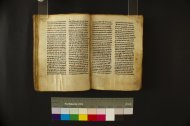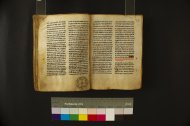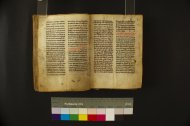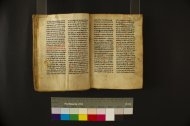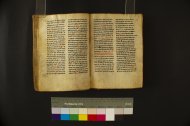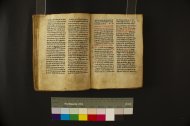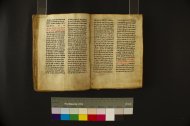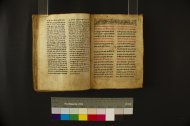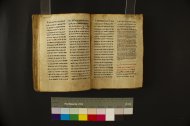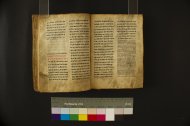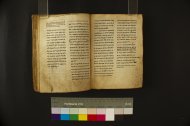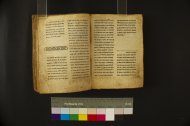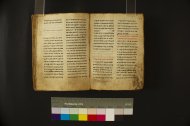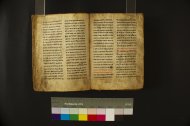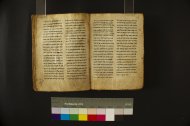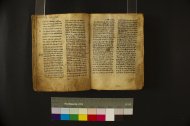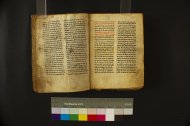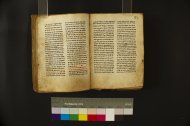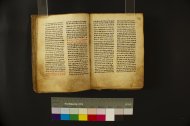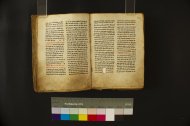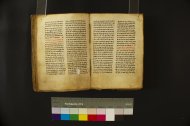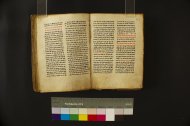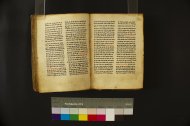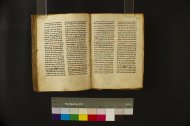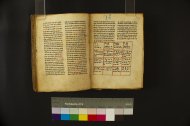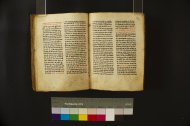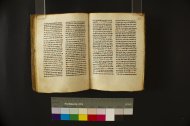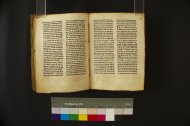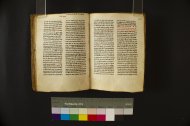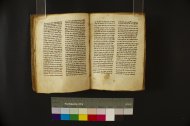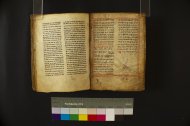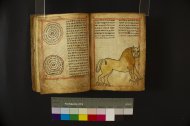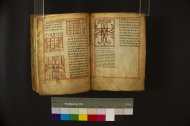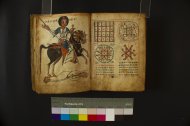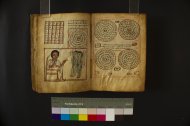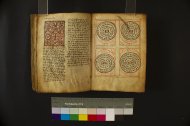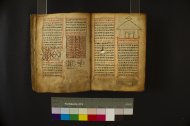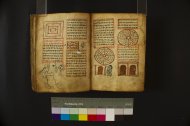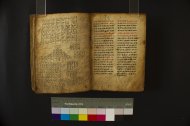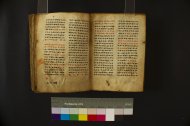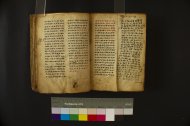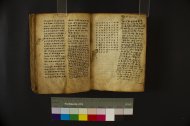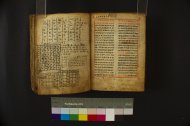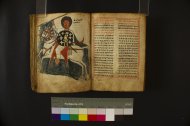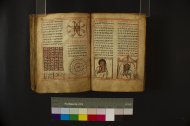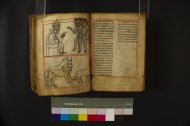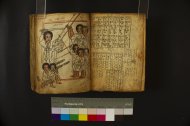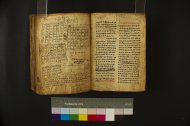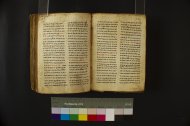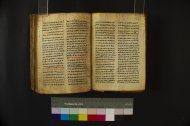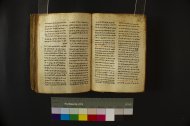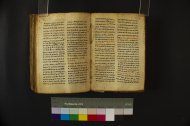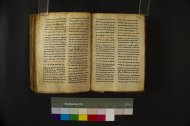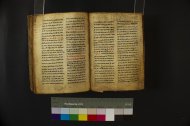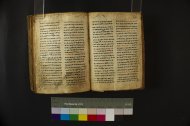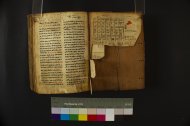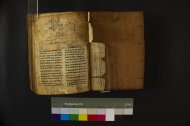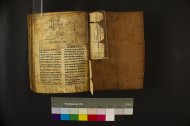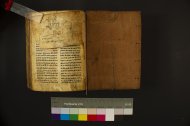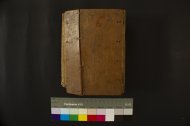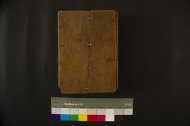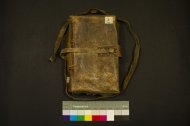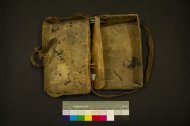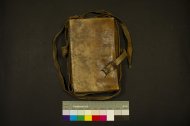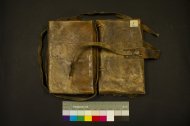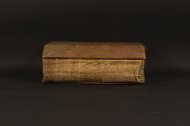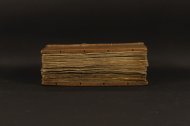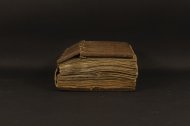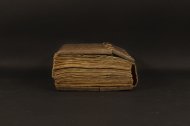|
Shelfmark |
SGI 246 |
|
Owning institution |
Società Geografica Italiana, Rome |
|
Typology |
Codex The manuscript is composite: it consists of 2 codicological units, both made with sheep parchment and written by the same hand: I (ff. 1–101), II (ff. 102–127). |
|
Title |
ʿAwdä nägäśt (“The Cycle of the Kings”); Ḥassabat (“Computi”) |
|
Subject |
Divination, Magic, Prayers |
|
Language |
Gǝʿǝz, Amharic |
|
Outer size (included the binding) |
175 x 124 x 55 mm |
|
Outer size of the textblock |
173 x 122 x 45 mm |
|
Number of folia |
127 |
|
Binding |
Two uncovered wooden boards. Four sewing stations. The spine is covered with parchment of different origin, whose edges are folded between the boards and the textblock as guardleaves. |
|
Sewing |
Two Z-twisted threads of animal origin. |
|
Sewing pattern |
Bozzacchi A |
|
Slip case |
Leather case. The leather is externally brownish and internally beige. Size: 215 x 155 x 65 mm. |
|
State of preservation of the binding |
Discrete. |
|
Provenance and history |
Unknown provenance. The two codicological units were bound together at an early stage, as demonstrated by the same hand throughout the manuscript. A certain Kidanä Śǝllase, whose name is mentioned in the main hand in various supplication formulas, was perhaps involved in the book production or owned the book. The book was most probably owned also by the Greek traveller and merchant balambaras Giyorgis, who lived in Ethiopia between 1870 and 1920. The manuscript is not mentioned in Silvio Zanutto’s Bibliografia etiopica (1932). It was inspected, foliated, and preliminarily described by Carlo Conti Rossini in 1941 (Conti Rossini, C. 1941. ‘Lo ʿAwda Nagast scritto divinatorio etiopico’, Rassegna di Studi Etiopici, 1 (1941), 127–45). This implies that the manuscript came into possession of the Società Geografica Italiana at some time between 1932 and 1941. |
Unit I (ff. 1–101)
|
Folia |
Ff. 1–101 |
|
Copying date |
Late 19th–early 20th century, dated on a paleographical basis. |
|
Short description of the content |
Ff. 3ra: Protective prayer, possibly incomplete Incipit: <…ሌ>ጌዎን፡ ካህ፡ ፫ሸላሜን፡ በሽላሜን፡ ፫ቀንተው፡ ሰንተው፡ ቀርነለው፡ ጉሃኤል፡ ኢያኤል፡ አማኑኤል፡ በሃሎኢ፡ አላሂ፡ ኢላሂ፡ አአምላከ፡ ጊዮርጊስ፡ አድኅነኒ፡ እምሕማመ፡ ዓይነት፡ ወዓይነ፡ ጽላ፡ ለገብርከ፡ ኪዳነ፡ ሥላሴ። Ff. 5ra–33ra: ʿAwdä nägäśt (“The Cycle of the Kings”).
Incipit: በስመ፡ እግዚአብሔር፡ መሐሪ፡ ወመስተሣህል፡ ኦእግዚእ፡ ኅረይ፡ ሊተ፡ ሠናይ፡ እስመ፡ አነ፡ ገጸፍኩ፡ ነፍስየ፡ ወሥጋየ፡ ኀቤከ፡ ወእሴፈወከ፡ ከመ፡ ታድኅነኒ፡ እምንዳቤየ፡ ኦእግዚኦ፡ ምርሀኒ፡ ፍኖተ፡ ዘታፈቅሮ፡ አንተ፡
Ff. 33ra–va: Ḥassabä Sabela (“Computus of Sibyl”) Incipit: ሐሳበ፡ ሳቤላ፡ በእንተ፡ ሰቆቃው፡ በዘተአምር፡ ሞተ፡ ዘመድ፡ ዓመተ፡ ምጝረት፡ ወንጌላዊ፡ ወአበቅቴ፡ ወጥንተዎን፡ መናብርተ፡ እ(33rb)ግዚአብሔር፡ ወዕለተ፡ ዮሐንስ፡ ስምከ፡ ወስመ፡ እምከ፡ ፲፯ግድፍ፡ ፩እኁከ፡ ይመውት፡ Ff. 33va–36ra: Läfidäl ḫwǝllaqwehu (Enumeration of the Ethiopian letters), including the meaning of each letter of the syllabary. Incipit: ለፊደል፡ ኍላቌሁ፡ መሥመሩ፡ ፳፮፡ ዘሩ፡ ፻፹፪እምአመ፡ ሀ፡ እስከ፡ ተ፡ ፸፩ሱባኤ፡ ኀ፡ ፪ሱባኤ፡ ነ፫ሱባኤ፡ አ፬ሱባኤ፡ ከ፭ሱባኤ፡ ወ፮ሱ፡ ዐ፯ሱ፡ ዘ፰ሱ፡ የ፱ሱ፡ ደ፡ ፲ሱ። እምአመ<፡> ሁ፡ እስከ፡ ተ፡ ፸ኍልቍ፡ F. 36rb: Ḥassabä kǝfl (“Computus of the division”), in 9 divinatory formulas Incipit: ሐሳበ፡ ክፍል፡ ስመከ፡ ወስሞ፡ በ፱ግድፍ። ፩ሠናይ፡ ክፍልከ፡ ወንዋየ፡ ንዑስ፡ ይሁበከ፡ ወበቃሉስ፡ ያሴፈወከ፡ ወድኅሬ፡ በልብ፡ ትትፋለጡ፡ ወኢትትአመኑ። ፪፡ ሠ፡ ክፍ፡ ውእቱ፡ ንበር፡ ምሳሌ፡ ያከብረከ፡ ወያሞግሰከ። Ff. 36va–40vb: Protective texts, mostly in Amharic Ff. 41ra–42ra: Ḥassabä adbar (“Computus of the mountains”), in 28 divinatory formulas for prediction. Incipit: ሐሳበ፡ አድባር፡ ስመከ፡ ወስመ፡ ሀገርከ፡ ወዓዲ፡ ስመ፡ እም፡ ወሰክ፡ በ፳፰ግድፍ፡ ፩ሠናይ፡ መሪር፡ ዖም፡ በታሕቱ፡ ቀይሕ፡ መሬት፡ በውስቴቱ፡ እስከ፡ ፯ዓመት፡ ንበር፡ ዓይነ፡ ማይ፡ በታሕቴሁ። The text is followed by four shorter ḥassab-texts similar in the structure: 1) F. 42ra–b: Ḥassabä kǝfl (“Computus of the division”), in 7 formulas; 2) Ff. 42rb–va: Ḥassabä zämän (“Computus of the time”), in 13 formulas; 3) F. 42va–b: Ḥassabä näbiyat (“Computus of the prophets”); 4) F. 42vb: Ḥassabä bǝʿl (“Computus of the wealth”). Ff. 43ra–49vb: Magical recipes in Gǝʿǝz and Amharic Incipit: በስመ፡ አብ፡ … ናውጽን፡ አንቅሕ፡ ወእለ፡ ነቅሐ፡ ይንቃሕ፡ እስኪቶ፡ ለገ፡ ሐፒካላፒ፡ ሐፒሎማ፡ ሲሎማ፡ እለ፡ ኖማ፡ አንቅሕ፡ ወእለ፡ ነቅሐ፡ ይንቃሕ፡ እስኪቶ፡ ለገብ፡ እግእግአግ፡ ደርዶርዶር፡ Ff. 50r–58v: Anqäṣ bäʾǝntä bǝʾsi wäbǝʾsit (“Chapter concerning the man and the woman”). Incipit: አንቀጽ፡ በእንተ፡ ብእሲ፡ ወብእሲት። ስምከ፡ ወስማ፡ በ፲ወ፭፡ ግድፍ። ፩ለእመ፡ አግባዕከ፡ ብእሲተ፡ ትከውን፡ ነፋስ፡ ትመውት። ፪ወለኵሉ፡ ነገር፡ ሠምር፡ ለከ፡ እግዚአብሔር፡ ኅሥሥ። Ff. 59ra–61va: Ḥassabä mogäd (“Computus of the flood”), in 5 chapters (anqäṣ). Incipit: ሐሳበ፡ ሞገድ፡ ስመ፡ ባሕቲቱ፡ በ፭ግድፍ፡ ፩ማኅተም፡ ሠናይ፡ ብዕል፡ ቀቲል፡ ፍቅረ፡ ሰብእ፡ መደንግፅ፡ ሀሎ፡ ዓቢይ፡ ወበዓለ፡ ጸጋ፡ ይከውን፡ ሥራየ፡ ይገብሩ፡ Ff. 66ra–67vb: magic recipes and magic texts in Gǝʿǝz and Amharic. Incipit: አኃዝ፡ ሥርወ፡ የሴት፡ በሐቌከ፡ ወድኅረ፡ ክሪ፡ ለእሉ፡ ዕፀዋት፡ በረቡዕ፡ ወበዓርብ፡ በንጹሕ፡ መሐሰ፡ ሥረዊሆሙ፡ ሰሌን፡ ገመሮ፡ እፀ፡ ዘዌ፡ ዕፀ፡ መናሄ፡ Ff. 67vb–68va: Ṣälot bäʾǝntä leba (“Prayer against thieves”), asmat-prayer Incipit: በስመ፡ … ጸሎት፡ በእንተ፡ ሌባ፡ ማሽ፡ ወለቤት፡ ተኳሽ፡ ባድን፡ ባድን፡ ባድን፡ ልድን፡ ፫ጊዜ፡ ያምን፡ ፫ጊ<ዜ፡> መድፍን፡ ፫ጊ<ዜ>፡ ጽፍን፡ ፫ጊ<ዜ>፡ ልቦሙ፡ በኃይለ፡፡ዝንቱ፡ አስማት፡ Ff. 68va–70va: Ḥassabä Ǝskǝ<n>dǝr (“Computus of Alexander”), divided in 6 small sections, each named after a star or a planet. Incipit: ሐሳበ፡ እስክ<ን>ድር፡ ዘይመጽእ፡ ዘይኤምር፡ ትእምርተ፡ ልደቶሙ፡ ወመዋዕለ፡ ዕብሬቶሙ፡ ለነገሥት፡ ወለመኳንንት፡ ስም፡ ወእም፡ በ፮ግድፍ፡ Ff. 70va–73rb: Ḥassabä ZäRädäšät (“Computus of ZäRädäšät (?)”), in 49 divinatory formulas. Incipit: ሐሳበ፡ ዘረደሸት፡ ስም፡ ወእም፡ ዓመተ፡ ምሕረት፡ ወንጌላዊ፡ ወርኅ፡ በ፵፱ግድፍ። ፩ዝፋል፡ ለእመ፡ ወጽአ፡ ለከ፡ ይትነሣእ፡ ብከ፡ ጸላዒ፡ እምኀበ፡ ፈቁርከ፡ ዘ፪አፉሁ፡ እ(70vb){እ}ምኔሁ፡ ትድኅን፡ በእግዚአብሔር፡ Ff. 73rb–73vb: Ḥassabä zämäča (“Computus of the fight”), in 30 divinatory formulas. Incipit: ሐሳበ፡ ዘመቻ፡ ወርኅ፡ የፍሥሐ፡ ኦሪት፡ ሌሊት፡ ፲፬፯ሠርቀ፡ (sic) ዕለት፡ አመ፡ ምሕረት፡ አበቅቴ፡ ጥንተዮን፡ መናብርተ፡ እግዚእ፡ ስመሙ፡ አርሴማ፡ እግረ፡ ሚጦር፡ ብርቴና። Ff. 73vb–74rb: Ḥassabä Arǝstä Aṭälis (“Computus of Aristoteles”). Incipit: ሐሳበ፡ አርስተ፡ አጠሊስ፡ ወክቡር፡ ባዕሳ፡ ዳዊት፡ ወጎልያድ፡ ስመ፡ ኍልቍ፡ ወስመ፡ ጎልያድ፡ በ፱ግድፍ፡ በዘተአምር፡ ዘይመውዕ፡ ወይትመዋዕ፡ ስመ፡ አጽራር፡ ወስመ፡ ፍቁራን፡ Ff. 74va–77ra: Astrological treatise on the zodiac signs. Incipit: እጽሕፍ፡ ለከዋክብት፡ አስማቲሆሙ፡ በ፲ወ፪ግድፍ፡ ፩ሐመል፡ ደቡባዊ፡ በ፩ግብር፡ ይተረጐማል፡ ፩ሐመል፡ ውጣኔሁ፡ እሳት፡ ዘበዳ፡ ሐያዲ፡ ይከውን፡ ወይመውት፡ በበዳ፡ ዘኢያነድድ፡ ሰብእ፡ ተዋስቦ፡ ዕፅ፡ F. 77ra: Ḥassabä Henok (“Computus of Enoch”), in 12 divinatory formulas. Incipit: ሐሳበ፡ ሄኖክ፡ ዘይመጽእ፡ ወዘኢይመጽእ፡ ፀር፡ ወንጉሥ፡ ወአረሚ፡ ጰጉሜ፡ ዓመት፡ ምሕረት፡፡ወንጌላዊ፡ ወርኅ፡ ሀገር፡ በ፲ወ፪ግድፍ፡ Ff. 77va–78rb: Ḥassabä adbar zäsǝbʾa Qǝbṭi (“Computus of the mountains of the people from Egypt”), in 28 divinatory formulas. Incipit: ሐሳበ፡ አድባር፡ ዘሰብአ፡ ቅብጢ፡ ስመከ፡ ወስመ፡ እምከ፡ ወስመ፡፡አድባር፡ በ፳፰ግድፍ፡ ወዘተርፈከ፡ አኃዝ፡ ፩ሠናይ፡ ለውሉድ፡ ወለበረከት፡ ወትረክብ፡ ጸጋ፡ ወጽድቅ፡ ፍጹመ፡ ወሕሙም፡ የሐዩ። Ff. 78rb–78vb: Ḥassabä kǝfl (“Computus of the division”), in 5 divinatory formulas. Incipit: ሐሳበ፡ ክፍል፡ ዘገብር፡ ወዘዓመት፡ ዘብእሲ፡ ወዘብእሲት፡ ስመከ፡ ወስሞ፡ በበ፭ግድፍ፡ ፩አግብኦ፡ በመልእክት፡ ያስተፌሥሐከ፡ ወትጉህ፡ Ff. 79ra–93rb: Ḥassabä käwakǝbt zätänagäro fälasfa (“Computus of the stars, said of the Philosopher”), in 12 chapters, each based on one of the zodiac signs. Incipit: በስመ፡ … እጽሕፍ፡ ሐሳበ፡ ከዋክብት፡ ዘተናገሮ፡ ፈላስፋ፡ ስመከ፡ ወስመ፡ እምከ፡ በ፲ወ፪፡ ግድፍ። ፩ሐመል፡ ኮከብ፡ ምስለ፡ ፲ወ፪፡ ከዋክብት፡ ይሠርቅ፡ አመ፡ ፩ለወርኃ፡ ሚያዝያ፡ መልክአ፡ ገጹ፡ በግዕ። Ff. 93rb–96rb: Ḥassabä maʿmǝr (“Computus of the learned man”), in 16 divinatory chapters. Incipit: ሐሳበ፡ ማዕምር፡ ስም፡ ወእም፡ በ፲ወ፮ግድፍ፡ ለአድባር፡ ወሰክ፡ ለገይስ፡ ወርኅ፡ ደም፡ ለዘመን፡ ዓመተ፡ ምሕረት፡ ወንጌላዊ፡ ወርኅ፡ ሀገር፡፡ወሰክ። ለተዋስቦ፡ ስሞ፡ ወእሞ፡ ስማ፡ ወእማ፡ በዝግድፍ። |
|
Writing material |
Sheep parchment |
|
Blank folia |
– |
|
Quires |
13 |
|
Quire marks |
Indicated in blue pencil on the upper margin of the first folio of each quire: ፩ (f. 5r), ፪ (f. 13r), ፫ (f. 21r), ፬ (f. 29r), ፭ (f. 40r), ፮ (f. 50r), ፯ (f. 58r), ፰ (f. 66r), ፱ (f. 74r), ፲ (f. 78r), ፲፩ (f. 88r), ፲፪ (f. 96r). Undecorated. |
|
Layout |
Ff. 5r–6r, 15r–49v, 59r–101v: 2 columns. Ff. 50r–58v: 1 column. |
|
Number of lines per column |
28–32 |
|
Ruling |
Blind ruling, from the inside to the outside. Lines are written above the ruling. |
|
Ruling pattern |
Nosnitsin 1 |
|
Scribe |
Unknown |
|
Colophon |
– |
|
Additional notes |
1. F. 3ra: short text containing asmat-names, written in a careless hand in black ink. The text begins as follows: ኢትገሥሮ፡ ያሮሰከ፡ ያከርሜል፡ ፒጣያኤል፡ ጴርኮሰ፡ ጕርጓሰባይ፡ አዲሎ፡ እምትዋፎን፡ አርግዕ፡ ልቦ፡. 2. F. 3rab: Abbreviated version of the Lǝssanä säbʾ (or Mälkǝʾa lǝssan, cp. Chaine nr. 314), written in a careless hand in pale black ink. The text begins on f. 3rb and follows on f. 3ra. Incipit: ናሁ፡ ተማኅፀንኩ፡ በፀአትከ፡ በሥጋዌከ። በልደታቲከ፡ በተጠብልሎትከ። በጉዝረትከ፡ በበዓትከ፡ እምልደትከ። በስደትከ፡ ወበጐይዮትከ።. 3. F. 65va–b: magic text containing asmat-names and transliterations of Greek letters, written in a pale black ink and embedding two rudimentary drawings in the same ink. Incipit: ፓፓ<፡> ይኅር፡ ፓፓ፡ ይፈር፡ ፓፓ፡ አፋኤል፡ ፓፓ፡ አካኤል፡ ፓፓ<፡> ያኤል፡ ፓፓ፡ ራሙኤል፡ ዝዝብኤል፡ ድልጣ፡ ዮጣ፡ ቤጣ፡ ጸዛኑኤል{ል} አልፋ<፡> ወኦ፡ ኢየሱስ፡ ክርስቶስ፡. |
|
Decoration |
F. 2r: two uncoloured stylized human figures, perhaps incomplete. The caption in written in Amharic pale black ink on the upper margin and is partially legible: አዳም፡ በበደስ፡ ዕውት፡ ጌታ፡ ክሶ፡ ቀራንዮ፡ ቆሟል፡ ከለሜዳ[…]ብ[…]፡. F. 2v: polychrome full-page portrait of Adam and Eve under the tree of life. Both are naked and hold leaves in their hands to cover themselves. Caption near Adam’s head: አዳም፡. F. 4r: two uncoloured polygon-shaped ornaments, each consisting of panels decorated with strips at their edges and stylized human faces in the middle. F. 4v: elaborated uncoloured cross decorated with strips at the four diagonals and stylized human faces in the middle and along the four main arms. Each of the circular ʿawd-tables of divination on ff. 7v–8r and 9v–14v is surmounted by a small-size human figure. Except those figures on ff. 8r and 9r, who represent uncoloured winged angels, all figures are polychrome or partially coloured and portrait individuals in the act of writing or holding a book: all of them are seated on thrones; some are crowned (ff. 10v, 12r); those on ff. 14r and 14v are depicted together with inkwells for black and red ink. F. 68va: black and red ornamental band (ḥaräg) consisting of four panels decorated with geometrical motifs. F. 70va: black and red ornamental band (ḥaräg) decorated with floral motifs. F. 72vb: uncoloured circular drawing decorated with floral motifs and a cross in the middle. The drawing is found in the lower margin of the leaf. F. 79r: black and red ornamental band (ḥaräg) decorated with floral motifs. F. 82va: uncoloured mental band (ḥaräg) consisting of five panels decorated with geometrical motifs, in all likelihood unfinished. |
|
State of preservation of the textblock |
Discrete. |
Unit II (ff. 102–127)
|
Folia |
Ff. 102–127 |
|
Copying date |
Late 19th–early 20th century, dated on a paleographical basis. |
|
Short description of the content |
Ff. 102ra–109rb: Text in undeciphered writing or pseudo-writing. The text is inscribed into frames in red ink and alternates with diagrams of divination of various geometrical shapes (squares, circles, stars). Some short Amharic and Gǝʿǝz texts are embedded within the text. Ff. 110ra–112vb: excerpts from the Gospels on the healing of the Gerasene demoniac: Mt 8.28–34 (ff. 110ra–vb), Mk 5.1–15 (ff. 111ra–vb); the passage from Luke is missing; incipit of Jn 1.1–5 (f. 112ra, incomplete due to the cut of col. b). F. 113ra: sequence of letters inscribed in boxes (obtained through blind ruling) and arranged to form a magic rectangle. Incipit: ቢ ስ ሚ ላ ሂ አ ረ ሂ ማ ን ሐ ጅ ኦ ዚ (cp. the Arabic basmala بِسْمِ ٱللَّٰهِ ٱلرَّحْمَٰنِ). Ff. 114ra–117rb: Text in undeciphered writing or pseudo-writing. The text is inscribed into frames in red ink and alternates with square and circular diagrams of divination. F. 119ra: end of an unidentified text of magical content Incipit: ሰብጥ፡ አዕይንቲሁ፡ ይሬኢ፡ ዘይርእይሙ። ይሰምዕ፡ ዘይሰምዖሙ፡ ይቤ፡ ፊቅጦር፡ ፈውሱ፡ ለዝ፡ ኮር፡ ድምባ፡ ሕርማሳ፡ ዘይት፡ ወትወዲ፡ ውስተ፡ አንፉ። Ff. 119rb–124vb: Anqäṣä tǝʾmǝrt (“The Gate of the omen”), divinatory text divided into 25 chapters (anqäṣ). Incipit: በስመ፡ እግዚአብሔር፡ መሐሪ፡ ወመስተሣ<ህ>ል፡ ፩ንቀጽ፡ ቀዳማዊ፡ ትእምርተ፡ አዳም፡ ትእምርተ፡ አዳም፡ ላዕሌሁ፡ ሰላም፡ ወውእቱ፡ ትእምርተ፡ ኅድአት፡ ሌሔዋን፡ ኢሰማዕከኑ፡ አዳም፡ ሀለወ፡ ቅሩብ፡ እምእግዚአብ<ሔር>፡ The text is incomplete. It ends abruptly as follows: ናሁ፡ ይመጽእ፡ ለከ፡ ኵሉ፡ ሠናና፡ (sic) ብዙኃ፡ እምኀበ፡ እግዚአብ<ሔር>፡ ዐቢይ፡ ወትሄሊ፡ በልብከ፡ ይትፌጸም፡ ወይከ፡ ለከ፡ ወአንተ፡ ብፁዕ፡ በቅድመ፡ እግዚ Ff. 125ra–126vb: unidentified text of magical content, probably the same as that on f. 119ra, consisting of sayings of Solomon and St Michael to the demons and magic cures by Fiqṭor. Incipit: ይቤ፡ ሰሎሞን፡ ለጋኔን፡ ዘስሙ፡ ዓቢቃብዮን፡ ዘውእቱ፡ ማኅደሩ፡ በመቃብር፡ ወቦቱ፡ ሐራ፡ ብዙኃን፡ በዚአሆሙ፡ አርያሆሙ፡ ተመሲሎሙ፡ እፎኑሙ፡ ትእኅዞሙ፡ ለሰብእ። The text is incomplete. It ends abruptly as follows: ይቤ፡ ሰሎሞን፡ ለጋኔን፡ ዘ፡ መሸብር፡ እፎኑ፡ ትእኅዞሙ፡ ለሰብእ፡ ይቤ፡ ንሕነ፡ ንሬስዮ፡ ይስሕቅ፡ በ፩ጊዜ፡ ንገ |
|
Writing material |
Sheep parchment |
|
Blank folia |
– |
|
Quires |
3 |
|
Quire marks |
Indicated in blue pencil on the upper margin of the first folio of each quire, in the same hand as those of Unit I: ፲፫ (f. 102r), ፲፬ (f. 110r), ፲፭ (f. 118r). Undecorated. |
|
Layout |
2 columns |
|
Number of lines per column |
23–27 22–23 within red frames (e.g. ff. 102r, 108r) |
|
Ruling |
Blind ruling, from the inside to the outside. Lines are written above the ruling. |
|
Ruling pattern |
Pattern Nosnitsin 1 |
|
Scribe |
Unknown |
|
Colophon |
– |
|
Additional notes |
1. F. 106va–b: unclear (protective?) note containing asmat-names, written on 2 columns in brownish ink. Incipit: አብ፡ ርርሆ፡ ወል፡ ርም፡ መ{፡}ሸተላ፡ ውእ፡ ቃል፡ ሥጋ፡ ከከልል፡ እስከ፡ ይበል፡ ፈነወ፡ አሕፃሁ፡ ወዘረዎሙ፡ ከማሁ፡ ዝርዎ፡ ለዝንቱ፡ በረድ፡ ኀበ፡ ሀሎ፡ ምድረ፡ 2. F. 109v: several tables and pyramidal diagrams of divination are drawn in pale black ink, with Ethiopic letters and numerals inscribed in each box. Close to a diagram is a barely legible caption, probably containing a protective formula. 3. F. 112vb: unclear text in Amharic, in black ink: ጅፍጅፍ፡ ፯ያፈታሕ፡ ፯ጀኸሊል፡ በመዓዛ፡ ህንዲ፡ ወመስተካ፡ ዝባድ፡ ፵፱ድግ፡. 4. F. 112vb: invocation to Jesus Christ, written in Gǝʿǝz in the same hand as the previous note. Incipit: ክርስቶስ፡ ጻድ፡ ወብር<ሃ>ን፡ ወምዕመን፡ ዘበአማን፡ ዘበእምቅከ፡ 5. F. 113rb: unclear (magic?) note containing asmat-names, written in black ink in a thick and careless hand. Incipit: ጐርጐር<፡> የሀጅ<፡> ፱ጐርጐር<፡> ባዴን፡ ፱በዴን<፡> ኰኩሻኤል<፡> ፱ናሙኤል፡ 6. F. 113v: four square and rectangular tables with Ethiopic letters inscribed in each box, forming asmat-names. Next to the uppermost table is written in pale black ink (perhaps in the same hand as note 2) ለባርያ፡ and below is written ለፍልጸት፡ ወለጋኔን፡ and, below, በጠጁን፡ በሐጁን፡ ማዕሰረ፡ ለጁን፡ ፍንጀና፡ ከማ፡ ዕሥሮ፡፡ወክንትሮ፡ ለጋኔን፡ ከመ፡ ኢይቅረብ፡. 7. F. 113vb: protective prayer against a species of ants or spiders: ጸሎተ፡ ጕንዳን፡ ፃጁር፡ ማጁር፡ ቃናት፡ ወልደ፡ ዳዊት፡ ጕንዳን፡ በምንት፡ ትነብር፡ በመሬት፡ በምድር፡ ጽሑቅ፡ ወግሁድ፡ ኩን፡ አለህ፡ ቃለ፡ አብ፡ ወወ፡ ወመ፡ ቅ፡ ኢትነብር፡ በዝ፡ መካን፡ እምቤተ፡ ገብ፡ እገ፡ ድግም. The conclusion of the text is erased. |
|
Decoration |
F. 103r: polychrome portrait of a lion. F. 104v: polychrome full-page portrait of St Basilides on horseback. The saint wears a blue tunic and holds a spear in his right hand. One human figure lies on the ground. Caption on the upper margin: ቅዱስ፡ ፋሲለደስ፡. F. 105r: polychrome half-page portrait of an individual (the Lord?) seated on a throne in the act of instructing two winged demons with their tongues out. F. 108rb: uncoloured stylized drawing of a church. F. 108va: uncoloured stylized drawing of a figure (a demon?) and a bird. F. 109ra–b: polychrome portrait of a small-size demon among three doors. F. 114v: polychrome full-page portrait of an unnamed equestrian martyr. The martyr holds a spear in his right hand and a black shield with white crosses in his left hand. Caption on the upper margin: ፈረሰኛ፡ ሰማዕት፡. F. 116ra–b: polychrome portrait of two human figures, of whom the one on the left holds a cross in his left hand and is depicted within a church. F. 116v: the upper half of the page hosts a polychrome portrait of an individual seated on a throne and supplied with a crown surmounted by a cross (an ecclesiastical authority) in the act of instructing three demons; the lower half of the page hosts a partially coloured portrait of two lions in the act of hunting a lamb. F. 117v: full-page portrait of a battle: two warriors in the lower left corner are depicted in the act of taking aim and shooting with their rifles, others on the right hold spears and shields in their hands. The scene is partially coloured. F. 127v: uncoloured stylized drawing of the Virgin Mary and the Child. The drawing is accompanied by a hardly understandable caption in Greek, perhaps σολομον βωωλ Μαρηαμ; the last two words might be a Greek transcription of wäl[dä] Maryam, i.e. ‘son of Mary’. |
|
State of preservation of the textblock |
Discrete. |


